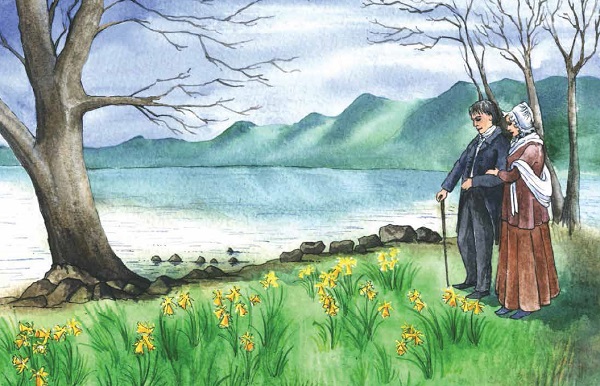Dorothy Wordsworth Born on Christmas Day 1771 in Cockermouth
Died on 25 January 1855 (aged 83) near Ambleside
‘Dorothy Wordsworth was more than William’s sister. She was a writer, friend, collaborator, aunt, pioneering walker, local philanthropist, inspiring gardener, and – perhaps most famously – author of the Grasmere journal.’*
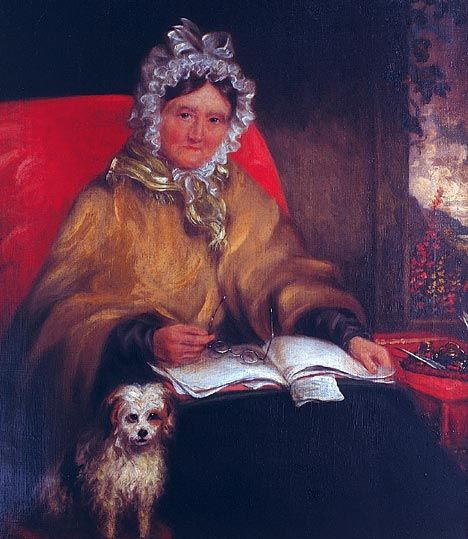
This painting of Dorothy Wordsworth with her dog, Little Miss Belle, was said to have been done by a self-taught artist
from nearby Cockermouth in 1833, and hangs in the living room at the Wordsworth home, Rydal Mount.
‘Two-and-a-half centuries after her birth the writer – and sister of the more famous William – still has much to teach us’- The Guardian
More on this a bit later. First:
Christmas With Wordsworths: A Celebration of Nature, Beauty, Hope and Wisdom
A Glimpse into Wordsworths’ Christmas Eve at Dove Cottage
There is no doubt that the adult Dorothy clearly relished being with her family at this time of year. She writes contentedly in her journal on Christmas Eve 1802 that 'William is now sitting by me [...] I have been beside him ever since tea running the heel of a stocking, repeating some of his sonnets to him, listening to his own repeating, reading some of Milton's & the Allegro & Penseroso'. This tiny glimpse of one seemingly unremarkable Christmas Eve at Dove Cottage, enables us to see a picture of genuine harmony and tenderness between the two siblings.
We can all imagine that whilst Christmas may have had sad associations at times for both William and Dorothy, given their separtion at childhood, then, they certainly cherished being reunited as adults. Even simple pleasures such as a walk together in and around Dove Cottage were moments to be treasured. This can clearly be seen in Dorothy's journal entry for 26 December 1801, in which the landscape is described as being so still and quiet that the pair could be the only people in the world at that moment:
‘The rain went off & we walked to Rydale - it was very pleasant - Grasmere Lake a beautiful image of stillness, clear as glass, reflecting all things - the wind was up & the waters sounding. The lake of a rich purple, the field a soft yellow, the Island yellowish-green, the copses Red Brown the mountains purple. The Church & buildings, how quiet they were!’
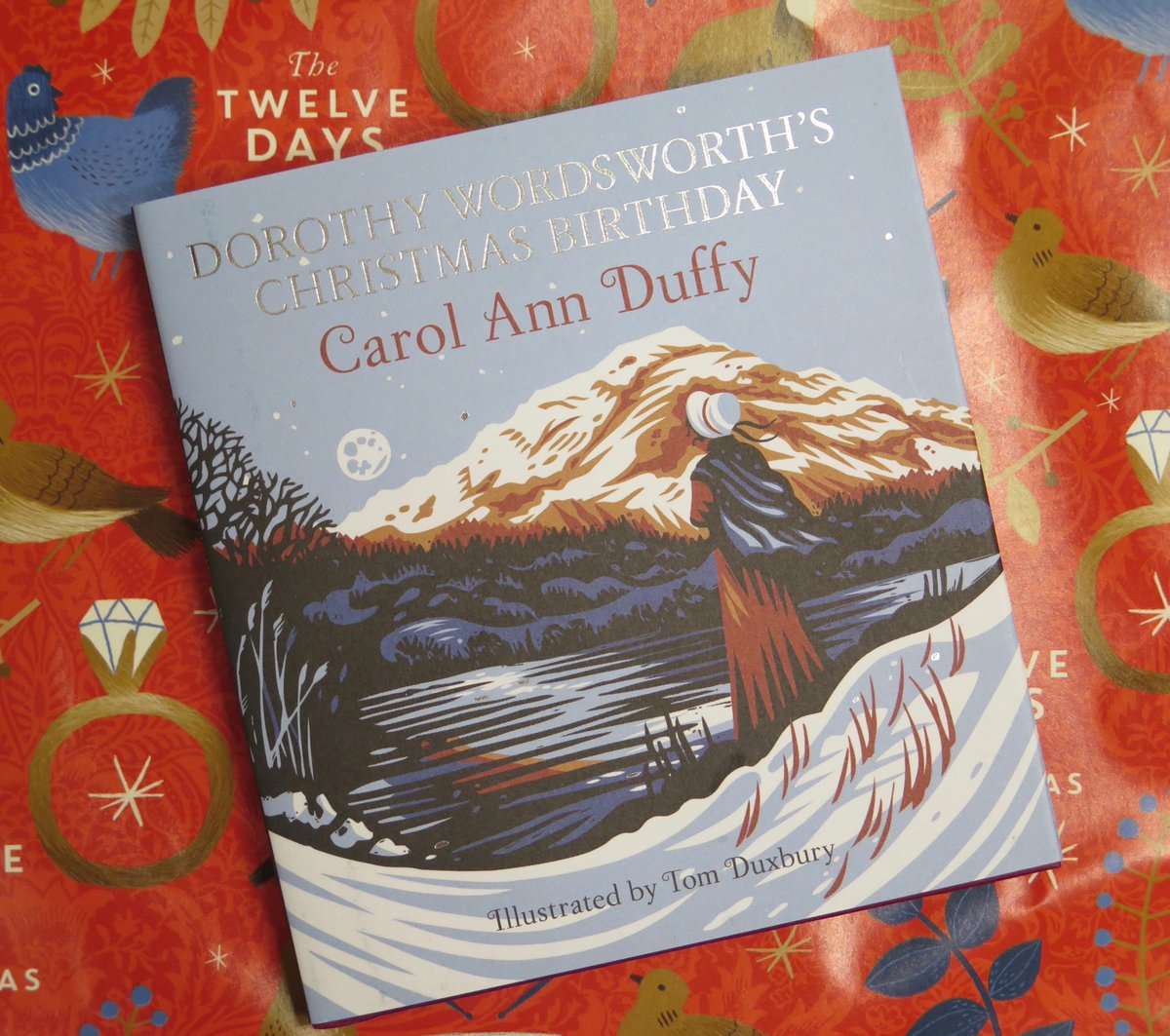
'It is Christmas Eve, 1799, and Dorothy Wordsworth is awake in the dead of night. She stands outside in the winter cold, waiting patiently. When the new day breaks it will bring family and friends to Dorothy's door. For tomorrow is a double joy: tomorrow is her Christmas Birthday.Carol Ann Duffy's wonderful poem Dorothy Wordsworth's Christmas Birthday takes us to the frozen landscape of the Lake District, where a merry celebration is about to begin in the Wordsworths' cottage...'
A Christmas poem by Carol Ann Duffy
'FIRST, FROST at midnight –
Moon, Venus and Jupiter
named in their places.
Ice, like a cold key,
turning its lock on the lake;
nervous stars trapped there.
Darkness, a hand poised
over the chord of the hills;
the strange word moveless.
The landscape muted;
soft apprehension of snow,
a holding of breath.
Up, rapt at her gate,
Dorothy Wordsworth ages
one year in an hour;
her Christmas birthday
inventoried by an owl,
clock-eyed, time-keeper.
Indoors, the thrilled fire
unwraps itself; sprightly hands
opening the coal.
For she cannot sleep,
Dorothy, primed with herself,
waiting for morning ...Dorothy Wordsworth’s Christmas Birthday
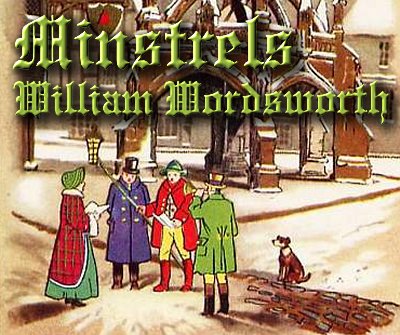
Photo:FamilyFriendsPoems
'In this famous narrative poem, William Wordsworth (1770-1850), recounts a Christmas tradition. Minstrels would travel door to door, playing music and providing wishes for a great Christmas season. In true Wordsworth fashion, this poem highlights the natural elements of the night. He uses descriptive language such as lofty moon, encircling laurels, and dazzling sheen.'
Minstrels
The minstrels played their Christmas tune
To-night beneath my cottage-eaves;
While, smitten by a lofty moon,
The encircling laurels, thick with leaves,
Gave back a rich and dazzling sheen,
That overpowered their natural green.
Through hill and valley every breeze
Had sunk to rest with folded wings:
Keen was the air, but could not freeze,
Nor check, the music of the strings;
So stout and hardy were the band
That scraped the chords with strenuous hand.
And who but listened?—till was paid
Respect to every inmate's claim,
The greeting given, the music played
In honour of each household name,
Duly pronounced with lusty call,
And "Merry Christmas" wished to all.
Dorothy Williams: A Perfect Sister
'She gave me eyes, she gave me ears;
And humble cares, and delicate fears;
A heart, the fountain of sweet tears;
And love, and thought, and joy.'- William Wordsworth
Dorothy Wordsworth and her brother William, just one year older than her, were separated in childhood after the deaths of their parents, but later on they reunited and remained inseparable…
Two of the most important and influential writings by Dorothy includes the "Alfoxden Journal," which covers the period between 1797-98, when Dorothy and her brother were living near the poet Samuel Taylor Coleridge in Somerset and her "Grasmere Journal," when she and William were living at Dove Cottage in Grasmere.
As Pamela Woof in ‘The Grasmere and Alfoxden Journals’ has observed, ‘Dorothy Wordsworth's journals are a unique record of her life with her brother William, at the time when he was at the height of his poetic powers. Invaluable for the insight they give into the daily life of the poet and his friendship with Coleridge, they are also remarkable for their spontaneity and immediacy, and for the vivid descriptions of people, places, and incidents that inspired some of Wordsworth's best-loved poems. The Grasmere Journal was begun at Dove Cottage in May 1800 and kept for three years. Dorothy notes the walks and the weather, the friends, country neighbours and beggars on the roads; she sets down accounts of the garden, of Wordsworth's marriage, their concern for Coleridge, the composition of poetry. The earlier Alfoxden Journal was written during 1797-8, when the Wordsworths lived near Coleridge in Somerset .Not intended for publication, but to 'give Wm Pleasure by it', both journals have a quality recognized by Wordsworth when he wrote of Dorothy that 'she gave me eyes, she gave me ears'. This edition brings the reader closer to the hurried flow of Dorothy's writing and includes rich explanatory notes about the places and people.’
All in all, Dorothy’s writings, including the journals are now recognized not only for her exceptional descriptions of nature’s beauty and wonder, but also for the way they inspired her brother. This can best be seen by noting a passage in her journal entry for 15 April 1802, describing daffodils, which later on inspires William Wordsworth's "Daffodils."
‘The wind was furious... the Lake was rough... When we were in the woods beyond Gowbarrow park we saw a few daffodils close to the water side, we fancied that the lake had floated the seeds ashore & that the little colony had so sprung up -- But as we went along there were more & yet more & at last under the boughs of the trees, we saw that there was a long belt of them along the shore, about the breadth of a country turnpike road. I never saw daffodils so beautiful they grew among the mossy stones about & about them, some rested their heads upon these stones as on a pillow for weariness & the rest tossed & reeled & danced & seemed as if they verily laughed with the wind that blew upon them over the Lake, they looked so gay ever glancing ever changing. This wind blew directly over the lake to them. There was here & there a little knot & a few stragglers a few yards higher up but they were so few as not to disturb the simplicity & unity & life of that one busy highway... -- Rain came on, we were wet.’
And then, two years later, Dorothoy's brother, William, composed, perhaps, the most famous poems
in the English language-"I Wandered Lonely as a Cloud".
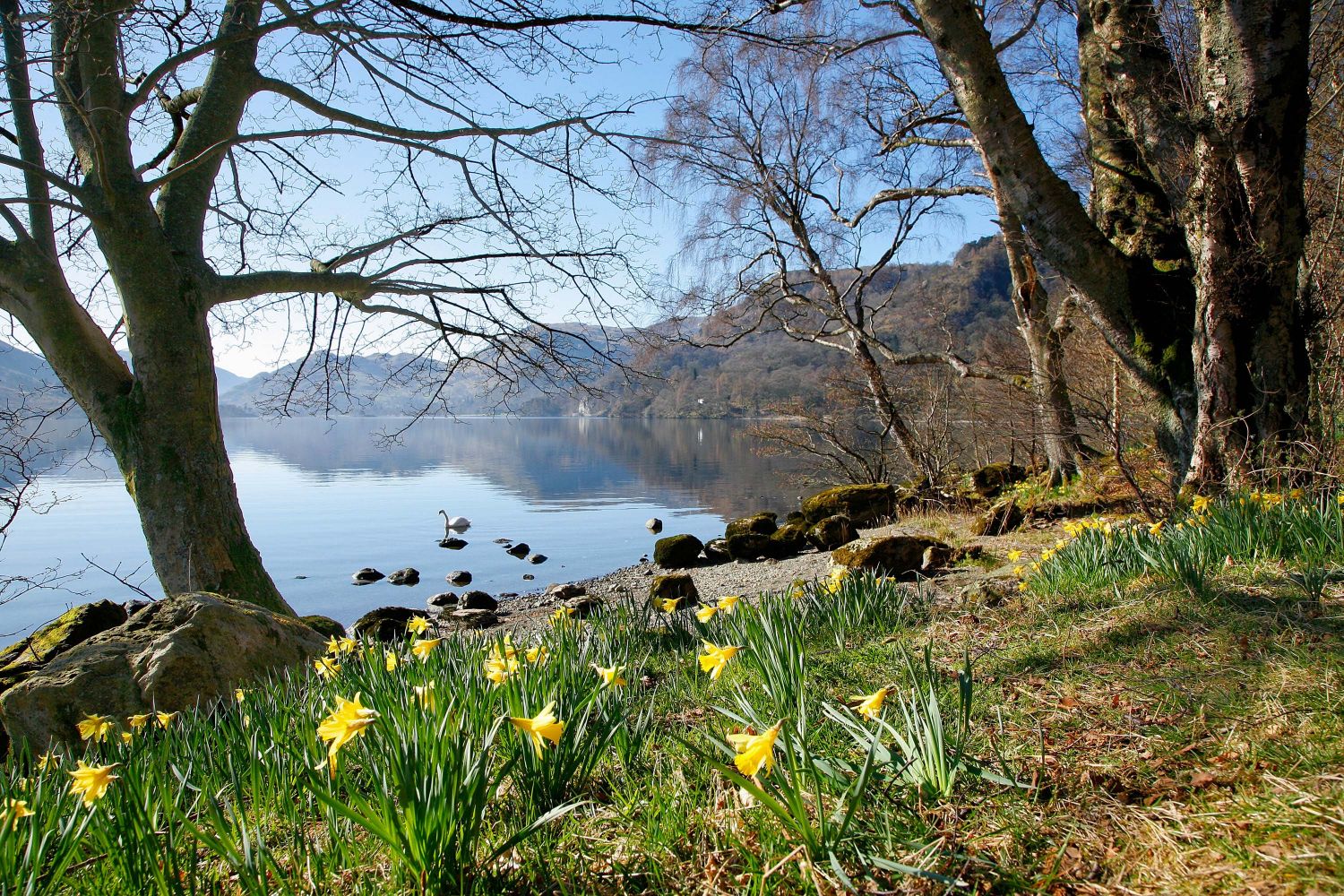
Daffodils At Wordsworth Point, Ullswater. This is perhaps the most likely place where
William and Dorothy first saw the daffodils.-Photo: Martin Lawrence Photography
Of all the famous poems of Wordsworth, none is more famous than "I Wandered Lonely as a Cloud".
In this poem, Wordsworth says that, wandering like a cloud floating above hills and valleys, he encountered a field of daffodils beside a lake. The dancing, fluttering flowers stretched endlessly along the shore, and though the waves of the lake danced beside the flowers, the daffodils outdid the water in glee. He says that a poet could not help but be happy in such a joyful company of flowers. He says that he stared and stared, but did not realize what wealth the scene would bring him. For now, whenever he feels “vacant” or “pensive,” the memory flashes upon “that inward eye / That is the bliss of solitude,” and his heart fills with pleasure, “and dances with the daffodils.”
I Wandered Lonely as a Cloud
That floats on high o'er vales and hills,
When all at once I saw a crowd,
A host, of golden daffodils;
Beside the lake, beneath the trees,
Fluttering and dancing in the breeze.
Continuous as the stars that shine
And twinkle on the milky way,
They stretched in never-ending line
Along the margin of a bay:
Ten thousand saw I at a glance,
Tossing their heads in sprightly dance.
The waves beside them danced; but they
Out-did the sparkling waves in glee:
A poet could not but be gay,
In such a jocund company:
I gazed—and gazed—but little thought
What wealth the show to me had brought:
For oft, when on my couch I lie
In vacant or in pensive mood,
They flash upon that inward eye
Which is the bliss of solitude;
And then my heart with pleasure fills,
And dances with the daffodils.
On the 250th Birthday of William Wordsworth Let Nature be our Wisest Teacher
What a blissful day it was- visiting Dove Cottage
'Dorothy Wordsworth: a rare achievement'
William and Dorothy admiring the wild daffodils at Gowbarrow in 1802. Painting by Juliet Whitworth
‘She has been described as “probably the most remarkable and the most distinguished of English prose writers who never wrote a line for the general public”; many have also argued that she directly influenced the course of English poetry.
Dorothy Wordsworth, born 250 years ago on Christmas Day, was not an obvious candidate for such accolades, being the third of five children, orphaned then farmed out to relatives – “squandered abroad”, as she later said, quoting The Merchant of Venice. When she met her brothers again, she found in William a soulmate; they would live together for the rest of their lives.
Her journals of their days, of the household (which she ran), and especially of landscape and seasons, were mined by her brother and sometimes by his friends for images, ideas, phrases. Strikingly, it was Dorothy who noted a wide belt of daffodils along a lake that “tossed and reeled and danced”, but this is only one small, albeit famous, instance of their collaboration; “Dorothy stored the mood in prose, and later William came and bathed in it and made it into poetry,” as Virginia Woolf would later put it. The poet-scholar Lucy Newlyn has argued that they were equal partners in writing, and William was always openly grateful: “She, in the midst of it all, preserved me still / A Poet, made me seek beneath that name, / My office upon earth” (The Prelude, 1805). “She has left her benign influence upon all later Romantic poets,” wrote Arthur Quiller-Couch. “She gave them eyes, she gave them ears.”
But she was far more than a skilled collaborator. Woolf wrote of how the quality of Dorothy’s noticing, and her utter commitment to accuracy in recording that noticing, gave rise to a particular beauty of prose, and even “the gift of the poet”; other critics have seen how in the journals certain lines lift free into poetry. She wrote discrete poems, too, and, having a complex relationship with publicity, published a few anonymously.
Generations of readers of her Grasmere journals acknowledge Dorothy as a first-rank nature writer; in her assumption of humans as “Companions of Nature” (rather than overlords) she is arguably also an early environmentalist, deeply aware and celebratory of the balance of nature. She is a major figure in the growing history of women walking – in defiance of social expectation, she walked for miles in the Lake District, Scotland and, later, mainland Europe, of which travels she also kept journals.
Finally, a new book by poet-critic Polly Atkin argues for Dorothy’s place in the writing of illness, mentions of which began to appear early but are especially evident in less well-known late journals, kept when she was increasingly bedbound and troubled but refused to give up on things that brought her intellectual stimulation and joy. Eventually, the outdoors was brought in, in the form of growing plants and flowers, and even a pet robin, which “cheared [sic] my bed-room with its slender subdued piping”. A narrowing world, she reminds us, need not lead to a narrowing of the self.’-Editorial, The Guardian, 19 December 2021
*Dorothy: Writer, Sister, Friend
The Grasmere and Alfoxden Journals
Dorothy Wordsworth on daffodils
Getting to know Dorothy Wordsworth
Dorothy Wordsworth and the Grasmere journals
The Grasmere Journal: seeing the Lake District through another Wordsworth's eyes
Climbing with Dorothy: the Wordsworth who put mountaineering on the map
In Appreciation of Nature, Beauty and Simple Living
A pick from our archive
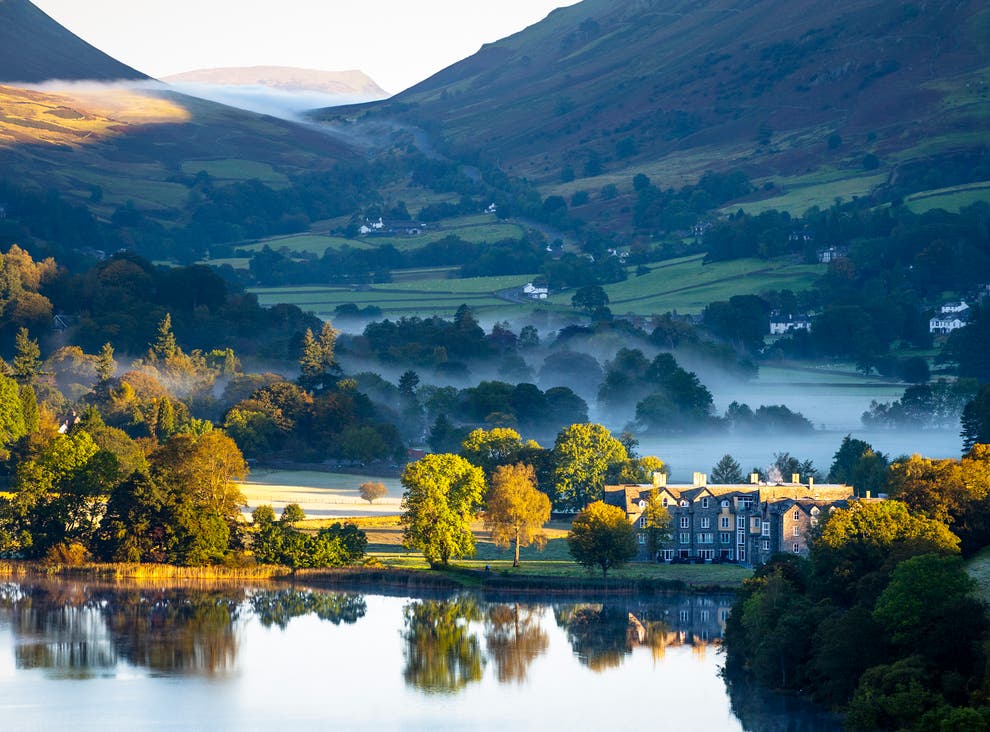
Sunrise in Grasmere, the Lake District.-(Getty Images)
In these troubled times let us be ordinary and enjoy the simple pleasures of life
Make 2019 the year of simplicity, so that all may live better
In a world of constant distraction seek solitude to attain contentment
Let’s Go to the Woods When Life Feels Overwhelming and Impossible
There is more in less: The Evolution of Simplicity
Why a Simple Life Matters: The Path to peace and happiness lies in the simple things in life
Transforming Lives for the Common Good: From Consumerism to Sustainability
Simplicity: it’s our true guide to a better life
The heart and the soul of education is wisdom
The beauty of living simply: the forgotten wisdom of William Morris
‘Nature and Me’: Realigning and Reconnecting with Mother Nature’s Wisdom- A Five Part Guide
Why should we all become mother nature and sacred earth guardians
THE Mother of all Values: The Value of Nature and the Environment
Land As Our Teacher: Rhythms of Nature Ushering in a Better World
‘Nature and Me’: ‘Nature as a Cure for the Sickness of Modern Times’
‘Nature and Me’: A Beautiful and Inspiring Path to repair our relationship with life
Detaching Nature from Economics is ‘Burning the Library of Life’
On the 250th Birthday of William Wordsworth Let Nature be our Wisest Teacher
The prophetic legacy of John Ruskin: A Man ahead of his time
“Now comes good sailing” whilst nature and simple living were his solace
GCGI is our journey of hope and the sweet fruit of a labour of love. It is free to access, and it is ad-free too. We spend hundreds of hours, volunteering our labour and time, spreading the word about what is good and what matters most. If you think that's a worthy mission, as we do—one with powerful leverage to make the world a better place—then, please consider offering your moral and spiritual support by joining our circle of friends, spreading the word about the GCGI and forwarding the website to all those who may be interested.
May you find joy in the simple pleasures of life and may the light of the holiday season fill your heart with the hope for a better world
Christmas and New Year Message Holds True: A Time to Be the Voice of Hope

